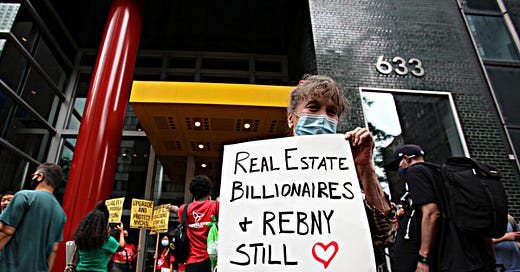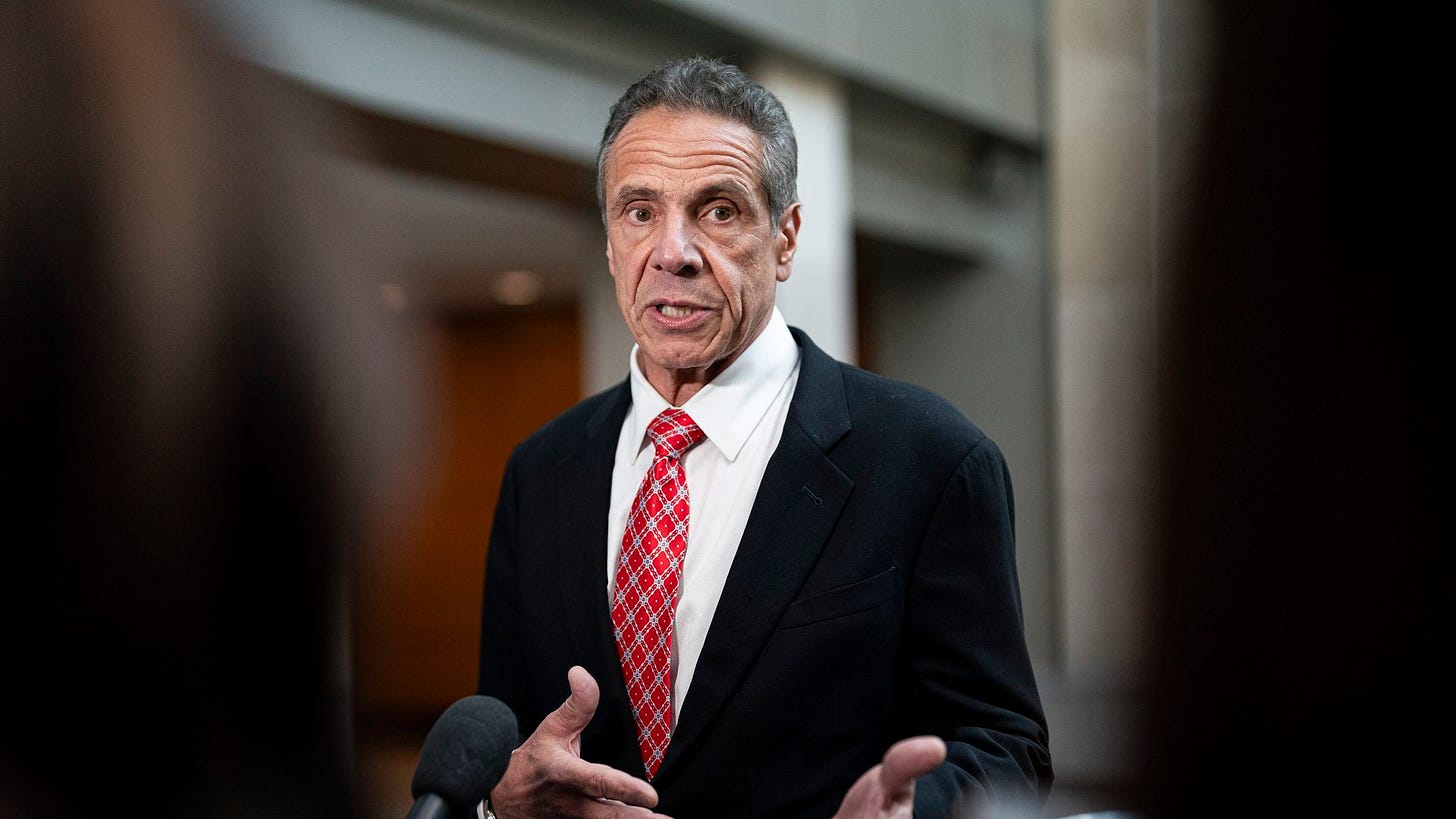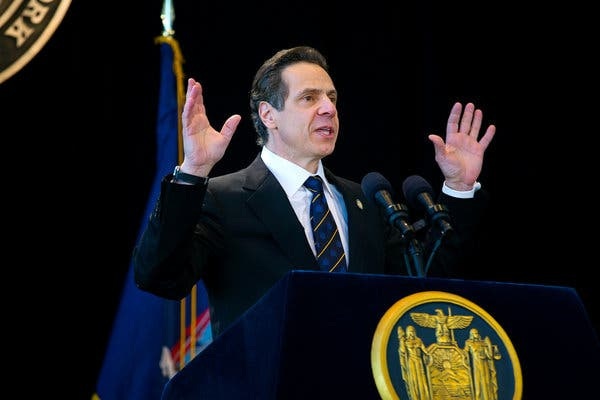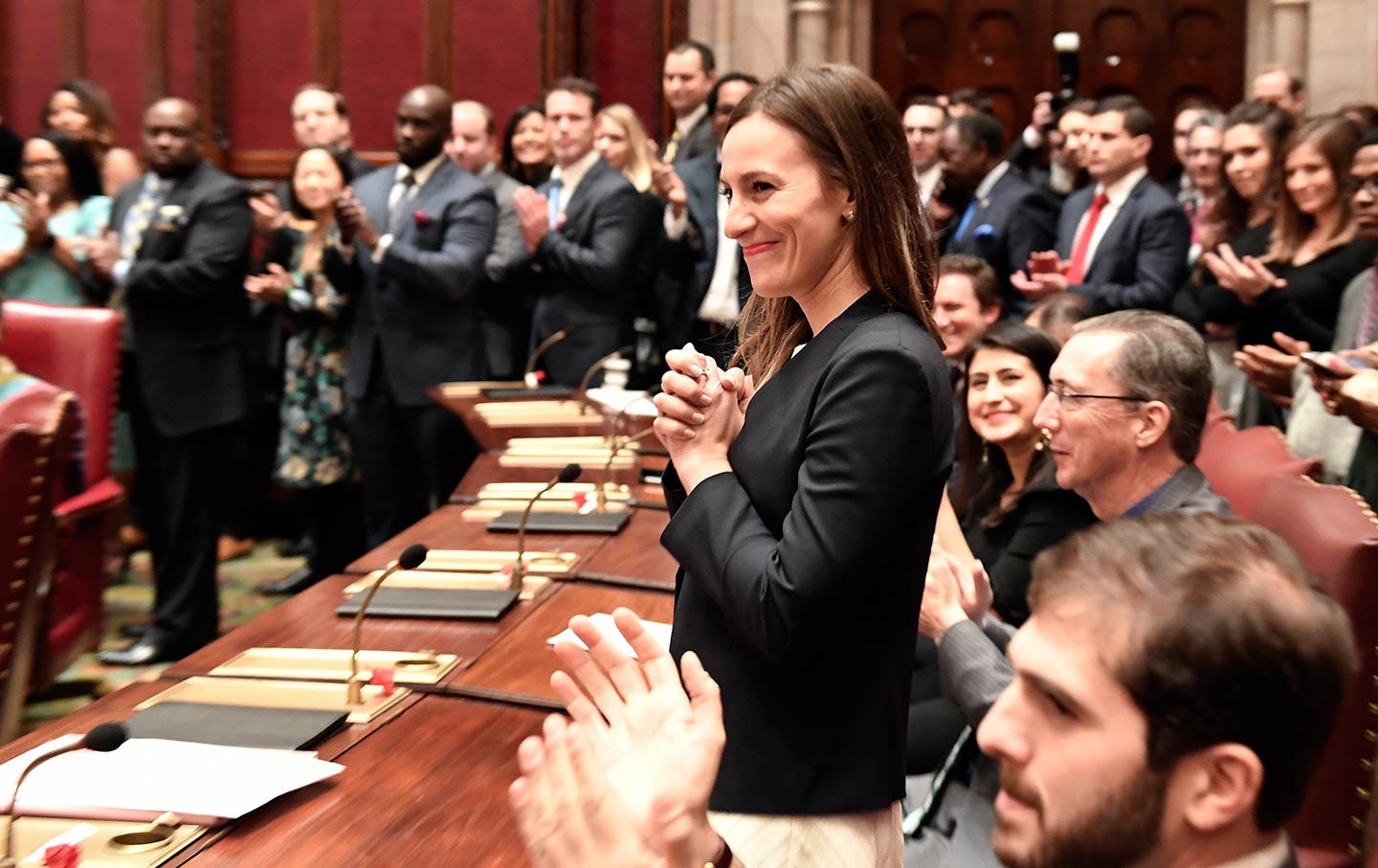Real estate’s big bucks support for Andrew Cuomo to NYC mayoralty is stunning – and frightening
By Michael McKee
Until very recently, Mayor Eric Adams was the favorite candidate of landlords and the real estate industry. In the area of rent increases and unaffordable, market-rate development, Eric delivered for them as Mayor, and they were happy with the results.
But in the wake of scandal after scandal, including federal criminal charges and his kissing Donald Trump’s ass to stay out of jail, the real estate lobby and the business class in general have realized that Eric Adams has virtually no chance of winning re-election, even with Ranked Choice Voting (RCV). Plus, Eric is not really campaigning for re-election, although he is still coming in a distant second or third in early polls.
Disgraced ex-Governor Andrew M. Cuomo declared four weeks ago that he was entering the contest. Based on universal name recognition and a questionable “Get it done” reputation, Cuomo is currently polling first.
Early polls are not very relevant, three months before the actual election. Both Andrew Cuomo and Eric Adams have high negative numbers from voters who disapprove of them, 42% disapproval for Cuomo and a stunning 82% disapproval rating for Mayor Adams.
The problem is that, under Ranked Choice Voting procedures, Cuomo is still poised to win the June 24 primary on the final ballot count.
With his public disgrace and bad public reputation, Andrew would likely be unable to win a regular, non-RCV primary. But he is only running to return to power and “restore” his reputation – it’s not about helping the city or its residents. Andrew can only possibly win a RCV primary with multiple ballot counts. More RCV information below.
And all of a sudden real estate titans who have contributed to Eric Adams in the past and endorsed him have switched to their longtime state-level ally Andrew Cuomo and have helped Andrew quickly raise $1.5 million for his campaign, and another $2.3 million in a real-estate backed, pro-Cuomo Super PAC.
Andrew Cuomo’s direct promise to landlords to weaken rent protections
In a closed-door meeting two weeks ago with members of the all-powerful Real Estate Board of New York, Andrew told REBNY members that he regretted signing the Housing Stability and Tenant Protection Act of 2019, that parts went “too far” in enhancing tenant protections.
Andrew specifically singled out two changes he thought were too strict on landlords: (1) severe limits on how much landlords of rent-controlled or rent-stabilized apartments could raise legal rents for Major Capital Improvements1 (regulated tenants could be hit with up to 15% annual rent hikes prior to 2019, but only 2% per year after 2019); and (2) how much landlords could raise legal rents for Individual Apartment Improvements2 (totally unlimited prior to 2019, a complicated formula post-2019, and which the legislature and Gov. Hochul had already essentially doubled in the 2023 amendments to HSTPA).
He promised the REBNY titans that if he becomes NYC Mayor, he will fight to make these pro-landlord changes. Of course, he would have to convince the state legislature and governor to enact these changes, and Andrew is not exactly well-liked by many state politicians.
(Politico link)
Andrew’s real estate supporters
In a very short time (although Andrew was no doubt planning to declare for a long time), Andrew Cuomo and his real estate cronies have reported a very impressive fundraising haul.
There are two separate fundraising goals: One is Andrew’s NYC campaign committee which has strict limits under NYC campaign finance law on how much donors can contribute. Some donors who do business with New York City are limited to a $400 contribution to mayoral candidates. The largest contribution allowed is $2,100.
Voters who live in the five boroughs and who make personal donations to a citywide candidate help them become eligible for an $8 to $1 New York City taxpayer subsidy to the candidate. This first filing shows that Andrew Cuomo is now eligible for matching funds.
More significant is the second goal, which is a state Super PAC which will make Independent Expenditures to support Andrew’s campaign, on the ostensible grounds that the campaign and Super PAC will not coordinate their activities. Many real estate developers and landlords have already donated large amounts to this SuperPAC, named FIX THE CITY. Sounds neutral, right? Not so much.
Among the hundreds of thousands real estate has given to the SuperPAC, Scott Rechler, CEO of RXR, contributed $250,000. (He also contributed $2,100 to the campaign committee, the maximum allowed.) A&E CEO Douglas Eisenberg contributed $125,000 to the Super PAC. Lightstone Real Estate Partners gave $100,000.
Other real estate figures who have contributed: Eight employees of Two Trees Management, including David Walentas and Jed Walentas (Jed serves as board chair of REBNY); ($2,000 combined). Bess Freedman, CEO of Brown Harris Stevens ($250). Marty Burger, Infinite Global Real Estate Partners CEO of Silverstein Properties ($400). Melanie La Rocca, BFC Partners’ chief operating officer and former city Buildings Commissioner ($500). David Rockwell, architect and Rockwell Group president ($2,100). James Nederlander, Broadway theatre owner and president of the Nederlander Organization ($2,100). Jodi Pulice, CEO of JRT Realty Group ($250). (as reported in Crains NY)
But some prominent real estate figures are holding off on supporting Andrew Cuomo, and some have supported other candidates. REBNY made a $2,100 donation to City Council Speaker Adrienne Adams shortly after she entered the race. Other mayoral candidates have also received real estate contributions, including Brad Lander, Zellnor Myrie, and Scott Stringer.
Andrew Cuomo failed to disclose lobbyists who bundled donations
Tonio Burgos, Jim Whelan, and Rick Ostroff told donors that their gifts would be matched with public funds, despite being barred by city election law
New York Focus obtained campaign finance reports including a March 7 filing by longtime Cuomo Family supporter lobbyist Tonio Burgos, in which he sent out a fundraising email seeking donations for Andrew Cuomo’s mayoral campaign. The email directed potential donors to a fundraising webpage set up by the Cuomo campaign that told them that their donations would be matched with taxpayer dollars – even though Burgos’s work as a registered NYC lobbyist means that any gifts he solicits are ineligible for a match under the city’s public campaign finance system.
New York City’s publicly funded elections program matches eligible donations in citywide races $8-to-$1, meaning that bundlers are far less valuable for campaigns if they are in the “doing business with the City” database.
The Cuomo campaign is legally required to report such bundlers, and did not do so. Burgos, Whelan, and Ostroff all included the following inaccurate sentence in their emails appeals to donors: “Your contribution up to $250 is matched eight times.” Cuomo’s campaign claims he has submitted $332,530 as eligible for matching funds.
Interesting donations to Andrew Cuomo and other Mayoral candidates
Here are some of the more amusing and interesting campaign contributions to several NYC mayoral candidates, per the March 17 reports:
Andrew Cuomo
New York Yankees President Randy Levine ($2,100). Ex-Donald Trump communications director Anthony Scaramucci ($2,100). Former Long Island state senator Todd Kaminsky ($400). Brooklyn City Council Member Susan Zhuang ($250). Staten Island City Council Member Kamillah Hanks ($100). Ex state Dept of Financial Services Superintendent Linda Lacewell ($2,100). Economist Jeffrey Sachs ($2,100).
Zohran Mamdani
“Saturday Night Live” actor Bowen Yang ($1,000). Award-winning author Jacqueline Woodson ($300). Former Manhattan Borough President candidate and major accuser of Andrew Cuomo Lindsey Boylan ($250). “Angels in America” playwright Tony Kushner ($2,100).
Adrienne Adams
State Attorney General Letitia James ($175). Ex NYC schools chancellor David Banks ($250). Terence Banks ($175). Partnership for New York City president and CEO Kathryn Wylde ($250). Brooklyn City Council Member Sandy Nurse ($100). Ex-Queens City Council Member I. Daneek Miller ($250).
Zellnor Myrie
Westchester State Senator Shelley B. Mayer ($1,000). Former Manhattan Council Member Helen Rosenthal ($250). Manhattan State Senator and Manhattan Borough President candidate Brad Hoylman-Sigal ($175). Brooklyn State Senator Roxanne Persaud ($100).
Brad Lander
Brooklyn City Council Member Lincoln Restler ($100). Ex-Queens Council Member Jimmy Van Bramer ($100). Lindsay Boylan ($250). Consultant and half of BerlinRosen Valerie Berlin ($2,100). George Soros ($2,100).
Jessica Ramos
Brad Hoylman-Sigal ($250). Lindsey Boylan ($250).
Michael Blake
Former Philadelphia Mayor Michael Nutter ($2,100). Actor Wendell Pierce ($2,100). Actor Leslie Odom, Jr. ($1,000). Actor Jussie Smollet ($1,000). Former NYC Nightlight Mayor Ariel Palitz ($100). Illinois Rep. Robin Kelly ($250).
Whitney Tilson
Whitney Tilson himself ($12,842). Pursuit CEO Jukay Hsu ($250).
Scott Stringer
Actress Scarlett Johansson ($2,100).
(as reported in City and State)
Andrew Cuomo WILL lie to NYC tenants, try to persuade us that he will be a pro-tenant mayor
The record is crystal clear. Everything Andrew Cuomo did during the 10.5 years he was Governor of New York State (2011-2021) was directed at helping the Republican State Senators stay in power, and he organized the rogue pro-landlord Democrats in the so-called Independent Democratic Conference to ally themselves with the G.O.P., even when the Republicans were a numerical minority in the Senate.
The Real-estate funded Republican Senate leadership and their IDC allies were determined to prevent even minor improvements to the rent and eviction protection laws, and especially to make sure that major reforms such as repeal of Vacancy Decontrol did not happen.
Twice in his two four-year terms, Andrew presided over negotiations when the state rent and coop conversion laws came up for renewal, in 2011 and again in 2015. Andrew made sure that Vacancy Decontrol was kept intact, meaning we lost tens of thousands of affordable apartments,. Andrew also pushed pro-development amendments through that made it lucrative for private, profit-making developers (including some of the richest people on the planet) to produce unaffordable, market rate housing.
In 2011 and again in 2015, Andrew reached out to me personally by mobile phone, to discuss what he claimed he was trying to do to protect tenants and preserve affordable housing. I knew these were mere PR efforts on his part, that what he claimed he was trying to do was not what he was actually up to. It was completely clear that his main goal was to preserve Vacancy Decontrol, which would allow the eventual phaseout of rent-regulated housing.
2015 was especially comical. My husband and I left the USA a few days before the end of the legislative session to go to Sweden to celebrate Midsummer in the countryside. It was clear that there was no danger that the rent and coop laws would not be renewed, and that the Vacancy Decontrol rent threshold would be raised, which Andrew would claim to be a great tenant victory, when in fact it was meaningless. (In 2011 the decontrol rent trigger was raised from $2,000 per month legal rent to $2,500 per month. In 2015, it went to $2,700 plus an annual inflationary adjustment.)
The night we arrived at our friend’s country house, I got a call from a DHCR staff member who wanted me to sign a position paper directed at the Senate Republicans. This was about 10:00 pm, although still light in Sweden, but it was afternoon in New York State.
A few minutes into the call I had a very loud BANG on my mobile phone and the DHCR staffer and I were disconnected. Andrew’s booming voice came on: “Mike! How are you, my friend?” as if we were long-lost buddies. He told me that he was trying to get the Senate Republicans to agree to pro-tenant reforms reducing rent increases for Major Capital Improvements. At the time there was a 6% rent cap on annual MCI rent hikes under NYC rent stabilization, but much higher under city rent control, suburban Emergency Tenant Protection Act, and state rent control, ranging up to 15% which were a tool landlords could use to pressure tenants to leave so they could impose Vacancy Decontrol. Even 6% for NYC rent-stabilized tenants was a real hardship.
I knew this was all nonsense, just Andrew trying to get me on board with him. He told me that he was driving his daughters around Westchester County. I never told him where I was.
2019 was totally different. Tenants PAC and the statewide Housing Justice for All had made a huge impact in the 2018 state elections. In the September 2018 Democratic primaries, we helped rout six of the eight rogue IDC Democrats, so come January these pro-landlord Senators would be replaced by progressive, pro-tenant legislators. A sweet moment for me was spending Primary Day in the Bronx helping progressive Alessandra Biaggi overwhelmingly defeat rightwing incumbent Jeff Klein, the founder of the IDC.
Then in November we helped the Democrats take overwhelming control of the state senate, going from a 32-31 GOP/IDC majority to a split of 40 Democrats and 23 Republicans as of January 1, 2019. At a time when 32 votes were needed to pass any bill on the floor of the Senate. It seemed clear that we would finally be able to win major pro-tenant reforms to the rent and eviction protection laws, now that both houses were to be Democratic-controlled.
In discussing how to proceed to win the kind of amazing progressive reforms we ended up winning when the legislature passed the Housing Stability and Tenant Protection Act of 2019 on June 14, 2019, we came to a strategy as early as December. We should ask the leaders of the two houses to negotiate directly with each other, and exclude Gov. Cuomo from the talks, as he would use the talks to water down the reforms.
Both Assembly Speaker Carl Heastie (Democrat, Bronx) and brand-new Senate Majority Leader Andrea Stewart-Cousins (Democrat, Yonkers) agreed with us. After conducting an extensive series of public hearings on housing and affordability and tenants’ rights throughout the state that spring, and in early June, the two leaders announced that they had negotiated a bill to renew the laws without input from the Governor, and to make important reforms to protect tenants and strengthen and preserve affordable housing.
Andrew was really angry about this and announced that he would veto any bill they sent to his desk unless he was included in the talks. Within hours Andrew realized that a veto threat was politically deadly for him, and changed his message to, “I will sign any bill they send to my desk.”
Over the next few days, Andrew kept insisting that Andrea Stewart-Cousins “did not have enough votes” to pass the bill, basically disrespecting her with reporters on a daily basis. PR-smart, the new Senate leader never rose to the bait, she even told reporters who asked her why he was attacking her that it didn’t matter, that sometimes “he just gets upset.”
On June 14, the Senate passed HSTPA on a 36-26 vote, and the Assembly passed it immediately after. Andrew signed it without issuing a statement 45 minutes after the Assembly gave the bill final passage.
What now??
New York City voters who rent their homes, and all progressive voters, must spend the next 11 weeks until the June 24 RCV primary, understanding how RCV works, and what we must do to make sure that Andrew Cuomo does not become our next Mayor. We need to be part of the D.R.E.A.M. campaign: DO NOT RANK ERIC OR ANDREW FOR MAYOR. The only chance either Andrew Cuomo or Eric Adams can win on the final ballot count is if enough voters rank them somewhere on their ballot. If they are not on enough written ballots, they cannot become Mayor based on the June 24 Democratic negotiation. (They could run on other lines in the November 4 general election, but neither Andrew or Eric would have good odds of winning then).
Stand by for more information about what we need to do in the coming weeks to make sure Andrew Cuomo returns to private life with his billionaire cronies in the Hamptons. \
Michael McKee has been a tenant organizer and advocate in New York State for 55 years, since 1970. McKee, who has served as Tenants PAC treasurer for over 25 years, is currently on medical leave while he undergoes treatment for a recently discovered brain tumor, but he is still devoting as much time as possible to the Tenant movement. He will be publishing a series of weekly manifestos until the end of session in June. Michael cut his teeth in the early 1970s organizing for Met Council on Housing, the oldest tenant union in New York City, and in the early-mid 1970s was a force in founding the first statewide tenant organization, New York State Tenants & Neighbors Coalition. In the 1970s and 1980s he was co-director of the statewide Peoples Housing Network which trained hundreds of tenant leaders and organizers and helped Tenants & Neighbors develop. Between 1975 and 1993 he was an officer of T&N including its statewide president for several years, and from 1993 to 2006 he was a T&N staff member until his retirement that year. Since 1997 he has served as volunteer treasurer of Tenants Political Action Committee, which was formed with the specific goal of helping the Democrats take control of the state senate. In 2018 the Rent Stabilization Association sued him for $40 million for alleged defamation. State Supreme Court dismissed the lawsuit in March 2023, and despite RSA’s attempt to appeal, this dismissal was upheld unanimously by the Appellate Court in 2025. For the last six years he has been an active member and adviser to Housing Justice for All, the statewide coalition.
or MCIs; expenditures on new building-wide systems, or upgrades (e.g., new wiring, new plumbing, new windows, new roofs, etc.)
or IAIs; new systems or upgrades in an individual apartment, usually when the apartment is vacant.







